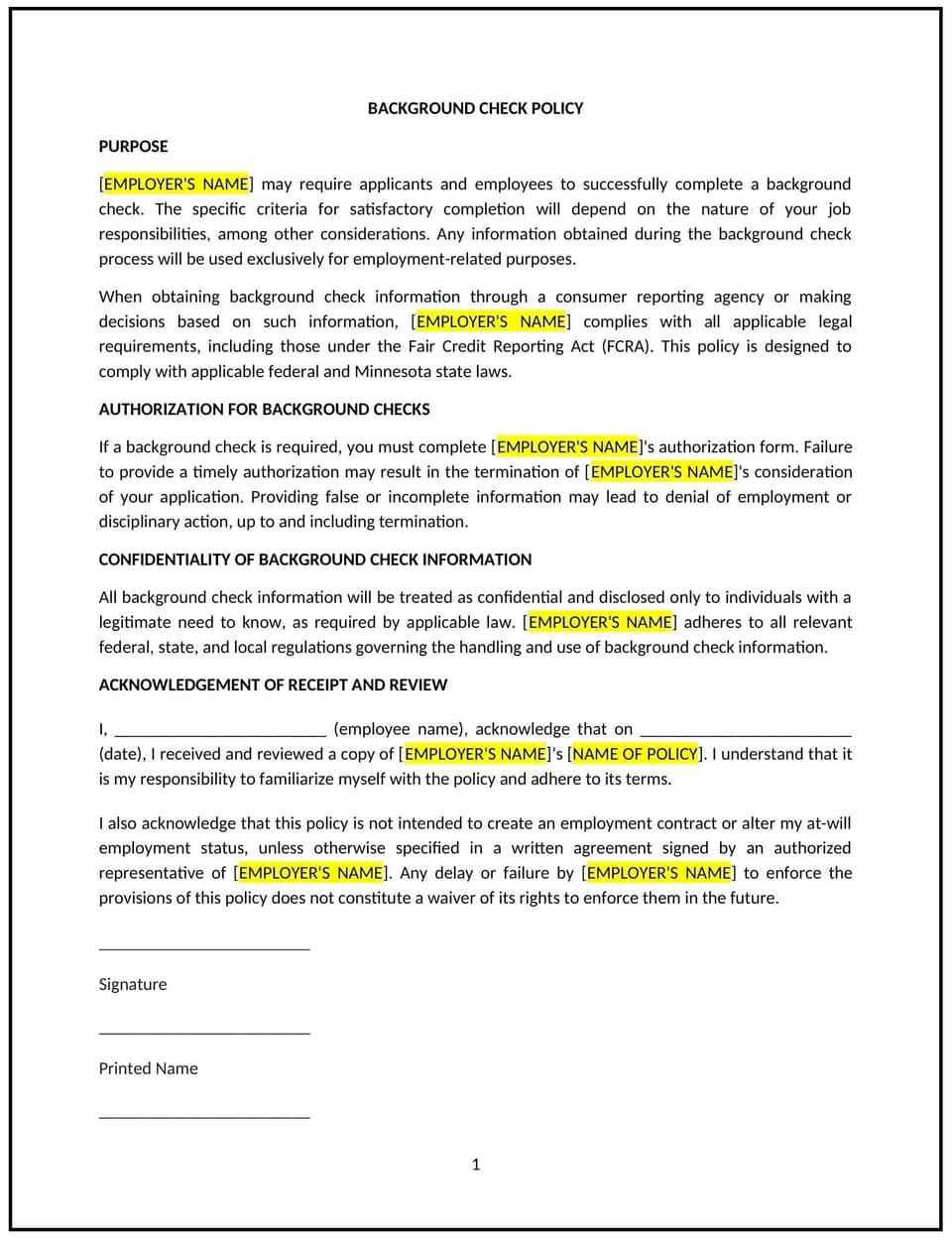Background check policy (Minnesota): Free template

Background check policy (Minnesota)
This background check policy is designed to help Minnesota businesses establish clear guidelines for conducting background checks on potential hires. Whether businesses are hiring for sensitive roles, ensuring workplace safety, or meeting industry standards, this policy provides a framework to make informed hiring decisions.
By implementing this policy, businesses in Minnesota can reduce hiring risks, protect workplace safety, and build trust with employees and applicants.
How to use this background check policy (Minnesota)
- Define the scope of background checks: Clearly outline the types of checks the business will conduct, such as criminal history, employment verification, or education verification.
- Establish consent procedures: Provide applicants with clear information about the background check process and obtain their written consent before proceeding.
- Comply with legal requirements: Ensure the policy aligns with Minnesota state laws, such as the Minnesota Human Rights Act, and federal regulations, including the Fair Credit Reporting Act (FCRA).
- Communicate results: Notify applicants if adverse actions are taken based on background check results and provide them with an opportunity to respond or dispute inaccuracies.
- Maintain confidentiality: Safeguard the privacy of applicant information and ensure background check results are used solely for hiring purposes.
- Train hiring managers: Educate staff on the policy’s guidelines, legal requirements, and best practices for conducting background checks.
- Review and update the policy: Regularly assess the policy’s effectiveness and make adjustments as needed to reflect changes in laws or business needs.
- Communicate the policy: Share the policy with applicants during the hiring process and with employees through onboarding or internal communications.
Benefits of using this background check policy (Minnesota)
This policy offers several advantages for Minnesota businesses:
- Reduces hiring risks: Conducting background checks helps businesses make informed decisions and avoid potential liabilities.
- Protects workplace safety: Screening applicants can help identify risks and create a safer environment for employees and customers.
- Builds trust: A transparent and fair background check process fosters trust with applicants and employees.
- Supports legal compliance: The policy helps businesses align with Minnesota state laws and federal regulations, such as the FCRA.
- Enhances hiring quality: Background checks provide valuable insights into an applicant’s qualifications and suitability for the role.
- Maintains confidentiality: Safeguarding applicant information demonstrates respect for privacy and professionalism.
- Improves reputation: A thorough and fair hiring process enhances the business’s reputation among applicants, employees, and the community.
Tips for using this background check policy (Minnesota)
- Communicate the policy effectively: Share the policy with applicants during the hiring process and with employees through onboarding or internal communications.
- Obtain consent: Always obtain written consent from applicants before conducting background checks.
- Be consistent: Apply the policy uniformly to all applicants to avoid perceptions of bias or discrimination.
- Address inaccuracies: Provide applicants with an opportunity to dispute or correct inaccurate background check results.
- Train hiring managers: Educate staff on the policy’s guidelines, legal requirements, and best practices for conducting background checks.
- Review the policy periodically: Update the policy as needed to reflect changes in laws, business needs, or industry standards.
Q: Why should Minnesota businesses adopt a background check policy?
A: Businesses should adopt this policy to make informed hiring decisions, protect workplace safety, and comply with legal requirements.
Q: What types of background checks should businesses conduct?
A: Businesses should conduct checks relevant to the role, such as criminal history, employment verification, or education verification, while complying with legal guidelines.
Q: How should businesses obtain consent for background checks?
A: Businesses should provide applicants with clear information about the background check process and obtain their written consent before proceeding.
Q: What should businesses do if background check results lead to adverse actions?
A: Businesses should notify applicants of adverse actions, provide a copy of the background check report, and allow them to respond or dispute inaccuracies.
Q: How can businesses ensure compliance with Minnesota state laws?
A: Businesses should align their policy with the Minnesota Human Rights Act and other relevant state and federal regulations, such as the FCRA.
Q: How often should the policy be reviewed?
A: The policy should be reviewed annually or as needed to reflect changes in laws, business needs, or industry standards.
Q: What role do hiring managers play in enforcing this policy?
A: Hiring managers should follow the policy’s guidelines, obtain consent, and ensure background checks are conducted fairly and consistently.
This article contains general legal information and does not contain legal advice. Cobrief is not a law firm or a substitute for an attorney or law firm. The law is complex and changes often. For legal advice, please ask a lawyer.


